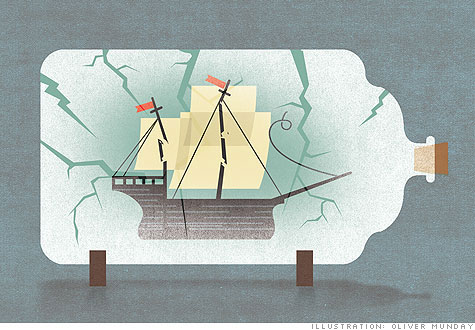Search News

Fidelity Magellan has faced some rough waters in the recent past. Can it ever find calmer seas?
(MONEY Magazine) -- Remember when Fidelity Magellan (FMAGX) was the fund to own?
Flash back to the late '70s and '80s, when Peter Lynch convinced us that beating the market was as easy as investing in what you know. Lynch trounced the S&P 500 (SPX) in his 13-year tenure and made Magellan a household name.
For years after Lynch left, money kept flowing in, until Magellan became the biggest mutual fund in the '90s with $106 billion in assets. But returns grew choppy, and managers came and went. By the 2000s, investors were abandoning ship.
Today the fund holds just $17 billion, and has yet another skipper. Jeffrey Feingold, who ran the decently performing Fidelity Trend, in September replaced Harry Lange, who came aboard in 2005 after leading the decently performing Fidelity Capital Appreciation.
A Fidelity spokesman says the company believes Feingold's experience "will result in great long-term performance."
Lange steered Magellan to losses when the S&P gained 2.4% a year, but the fund ran aground for bigger reasons than the underperformance of one manager.
Consider that:
It was hard to beat the market in the long run
Lynch did it for about a decade. "But even if he stayed on, we don't know if he would have been able to keep doing it," says Baylor finance professor William Reichenstein. What we do know is that fewer than two in five blue-chip stock pickers have beaten the S&P 500 over the past five years, partly because of higher expenses and trading costs.
The company wouldn't shutter a giant portfolio
"Fidelity deserves a huge amount of blame," says Russel Kinnel, head of Morningstar's fund research. By failing to close the fund early on -- because it couldn't resist the fees it was earning at the time -- Fidelity made Magellan nearly impossible to manage.
"Once a fund is over $100 billion, and you still want one guy to run it, it's a little crazy," Kinnel says. Companies routinely close big stock funds to new investors or at least, as is the case with American Funds, employ multiple managers, giving each more time for research.
Shareholders chased performance
By jumping on the bandwagon in the '80s and '90s and then fleeing in droves, investors made it harder for Magellan's managers to outperform. When money was flowing in too quickly, they couldn't put it all to work in their best ideas. Then, when shareholders bolted, Magellan had to sell to meet redemptions.
The fund chased performance, too
Under Lynch, Magellan bet on smaller stocks when those were hot. In the '90s under Jeffrey Vinik, the fund ventured into bonds before they became cool to own. Under Robert Stansky, Magellan acted like an index fund after the market began to stall.
And under Lange, it became aggressive as investors turned skittish. By continually changing direction, Fidelity boosted the chances of Magellan faltering. ![]()
| Overnight Avg Rate | Latest | Change | Last Week |
|---|---|---|---|
| 30 yr fixed | 3.80% | 3.88% | |
| 15 yr fixed | 3.20% | 3.23% | |
| 5/1 ARM | 3.84% | 3.88% | |
| 30 yr refi | 3.82% | 3.93% | |
| 15 yr refi | 3.20% | 3.23% |
Today's featured rates: